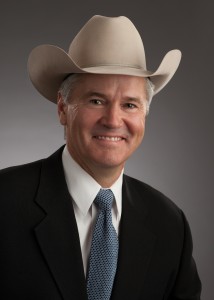
Agricultural News
Fresh Beef from Brazil: Incomplete Review Means Too Much Risk for Too Little Reward
Tue, 27 Sep 2016 16:27:15 CDT
 The following is an opinion piece from the Texas and Southwestern Cattle Raisers Association:
The following is an opinion piece from the Texas and Southwestern Cattle Raisers Association:
Because the U.S. cattle herd has been safe from foot-and-mouth disease (FMD) since 1929, I am concerned by the Aug. 1 announcement from U.S. Department of Agriculture (USDA) that we are considering the importation of fresh beef from Brazil, a country that has an active vaccination program against FMD.
We hold other trading partners to standards that require their cattle herds to be free of a disease, and not just vaccinated against it. We should not relax our requirements for Brazil.
Foot-and-mouth disease is not a threat to human health, but it is devastating to the livestock species that are susceptible to it. Ranchers in countries, such as Brazil, mount hugely expensive animal health campaigns to control the disease and work to eradicate it. Our major trading partners, Canada, Australia and New Zealand, are FMD-free.
Thankfully, we were able to eradicate FMD from U.S. herds nearly 100 years ago. It is disappointing that USDA moved forward with its decision to allow the importation of fresh beef from Brazil before the Government Accountability Office (GAO) had completed its audit of the procedures USDA used to formulate its rules for importation.
A bill that passed Congress at the end of last year - a bill that TSCRA helped to get passed - included language that required audits and site inspections of packing facilities in Brazil and included language that required USDA to outline the process for their audits.
At the time, this language was touted as a great victory for the U.S. cattle industry. Now, we have to ask why USDA is going forward with allowing fresh beef to be imported from Brazil and not fulfilling the requirements of the bill.
TSCRA has very clear policy on trade and protection of the health of the cattle herd. A 2014 resolution states we oppose the "importation of live cattle, beef, and/or beef products into the U.S. from foreign countries with histories of significant chronic animal diseases and lack of strict animal disease control and eradication measures."
TSCRA supports "independent scientific and legal analyses of USDA proposals, risk assessments, and supporting information, when necessary, to substantiate risk levels of imported live cattle, beef, and/or beef products and assure the protection of the U.S. cattle industry.
TSCRA expects "that slaughter, processing, transporting, and other facilities and equipment used to export foreign live cattle, beef, and/or beef products into the U.S. be subject to equivalent, or greater, inspection and sanitation requirements applicable to U.S. inspected facilities and equipment."
And the association "requests that the USDA continue to take all reasonable and appropriate measures to protect the U.S. cattle industry from the introduction of foreign animal diseases, and communicate to foreign countries that wish to export live cattle, beef, and/or beef products to the U.S. to commit to enhanced efforts to control and eradicate animal diseases that may be a chronic problem in their country."
USDA says that due to the FMD vaccination protocols followed by Brazilian ranchers the risk of FMD being brought into this country in fresh beef is very low.
Nevertheless, a risk remains, and for a small reward.
We imported more than 570,000 metric tons of beef from Australia in 2015, and almost 300,000 metric tons of beef from New Zealand that year. We imported 285,036 metric tons from Canada in 2015.
Until we have a trade agreement with Brazil, fresh beef imports from that country will be limited to less than 65,000 metric tons. At the most, we could expect 5.5 percent of our imported beef to come from Brazil. Are we willing to risk the health of the U.S. beef herd on such a small amount?
The slightest risk, no matter how small, is not worth getting FMD in this country.
I encourage TSCRA members and ranchers to call on your members of Congress to take action on this issue before the end of the year. Apparently, USDA did not get the message. It makes sense to delay importation of fresh beef from Brazil until the GAO audit is completed.
TSCRA supports trade with other countries, but we do not want to forego science and expose the rest of this industry to a risk we already fought almost 100 years ago. It was expensive then; it would be devastating now.
Robert "Bobby" McKnight Jr., of Fort Davis, Texas, raises registered and commercial Herefords and crossbred cattle on ranch land in Jeff Davis, Brewster, Presidio, Reeves and Crane counties. He became a TSCRA director in 1989, and he currently serves as the TSCRA first vice president.
Source - Texas and Southwestern Cattle Raisers Association
WebReadyTM Powered by WireReady® NSI
Top Agricultural News
More Headlines...



















